Biography
Nikolai Nikolaevich Sidelnikov (N. N. Sidelnikov) was born 5th June 1930 in Kalinin (now Tver) into a musical family.

Nikolai's father - Nikolai Mikhailovich Sidelnikov was an outstanding cultural figure in the Tver region. For many years he was the musical director, composer and conductor of the Kalinin Drama Theater Orchestra. In 1948 he headed the Kalinin Regional Philharmonic Society. He was also the founder and artistic director of the Kalinin Philharmonic Orchestra and led the choir collectives in the city and conducted pedagogical activities.
N. M. Sidelnikov was known for having a good voice (dramatic tenor) and playing several musical instruments. He was a passionate collector of books and sheet music including rare copies. He purchased scores and claviers from numerous publishers such as P. Jurgenson and the international Peters publishing house. The pride of the Sidelnikov family was a huge library, which occupied two of the three rooms in their apartment.
N. M. Sidelnikov was the first person who recognized the talent of the future famous tenor Sergei Lemeshev who came to Tver in 1919 from the countryside to pursue his musical interests. He became Lemeshev’s creative mentor sending him to study in Moscow and providing him with a letter of recommendation.

On the 30th January 2019 N. M. Sidelnikov was honored with a memorial plaque at the Tver Academic Regional Philharmonic Society.
N. N. Sidelnikov’s mother - Maria Alekseevna Speranskaya was from an aristocractic family. Having an extraordinary voice (lyrical-coloratura soprano) she studied vocals at the Moscow Conservatory under maestro Umberto Mazetti who was the greatest vocal teacher of the time. Mazetti was responsible for the success of numerous prominent Russian singers including A. Nezhdanova and N. Obukhov.
In her youth M. A. Speranskaya performed on stage at the Bolshoi Theater with the famous Russian bass G. S. Pirogov. Later she taught vocals at the Kalinin College of music.
The Sidelnikov family was literally saturated with music. Friends -musicians often gathered and filled the house with vocal and instrumental music from composers of different epochs. N. M. Sidelnikov sitting at the piano often performed arias from Russian and foreign operas.
Gregory Haimovsky wrote that from his childhood memories of N. N. Sidelnikov: “I often visited the Sidelnikov`s family. Sometimes we had lunch together, but somehow without the interest of food. Read, read it was Nikolai`s passion. When asked he would appear in an instant with any book I could think of. No need to tell you about the classics, especially, Russian!
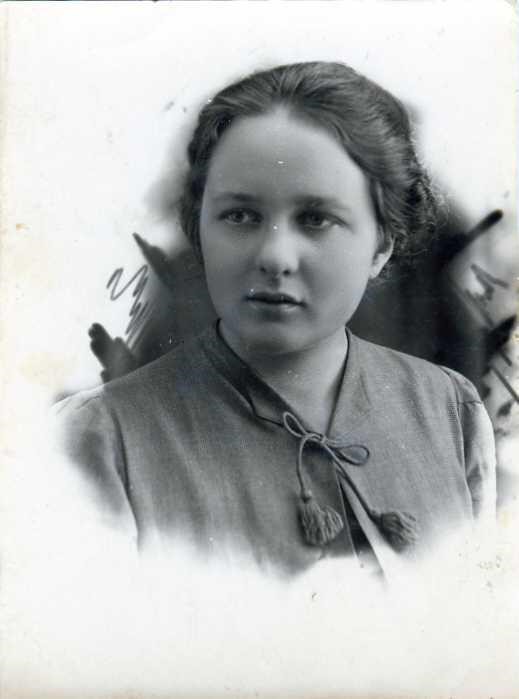 Tatiana Sidelnikova
Tatiana Sidelnikova
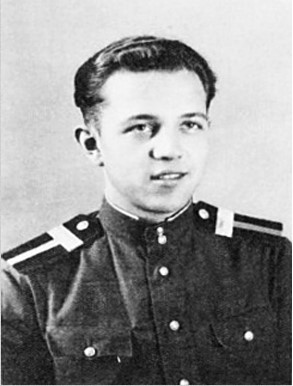
N. N. Sidelnikov was the third child in the family. The elder stepsister Tatiana became a philologist. The middle brother Mikhail graduated from Kalinin musical College and remained to teach music theory.
N. N. Sidelnikov obtained basic musical knowledge and skills from his father. Since early childhood his father had taught him to play fortepiano, practicing harmony and counterpoint. From the composer's own memories at the age of seven he already played the piano quite well and could solve harmony tasks from A. Arensky's exercise book. To assist his father’s conducting work he was responsible for censoring music sheets in different keys. The Gorky Tver provincial library, still keeps many rewritten orchestral charts by N. N. Sidelnikov that show his extraordinary attention to detail and accuracy. A skill he introduced to his own future manuscripts which are often noted for their exceptional order and clarity.
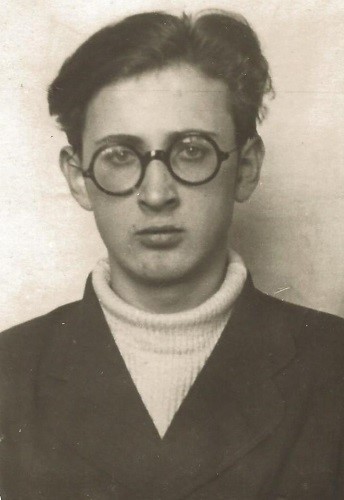
For entry into the Kalinin musical College N. N. Sidelnikov prepared himself independently. From 1946 to 1949 he studied at the piano faculty under the guidance of E. N. Noskova and O. M. Brodskya. After graduating College in just three years (instead of four) he enrolled in the class of E. I. Messner, Faculty of Composition at the Moscow Conservatory. In 1950 he studied at the Moscow conservatory's composer's faculty taught by Professor A. N. Alexandrov.
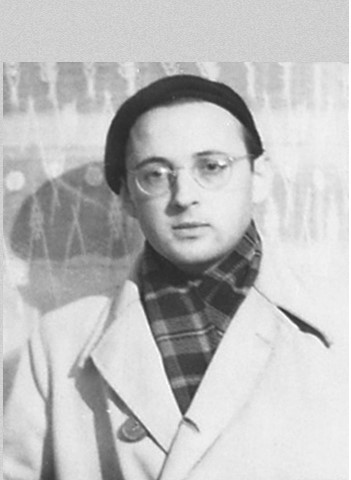
From 1951 to 1953, N. N. Sidelnikov was on academic leave with the right to reinstate himself to the third year of study under the condition of successfully passing entrance exams. During this period he returned to Kalinin and taught at the Kalinin musical College. Later to improve his health he travelled to the Crimea where he met the outstanding pianist Heinrich Neuhaus who later became his teacher. N. N. Sidelnikov dedicated Two Fugues for piano to his favorite teacher and remained lifelong friends with the Neigauz family. Returning to the Moscow conservatory he continued his studies at the composition`s class of E. I. Messner and was also taught organ by A.F. Gedike.
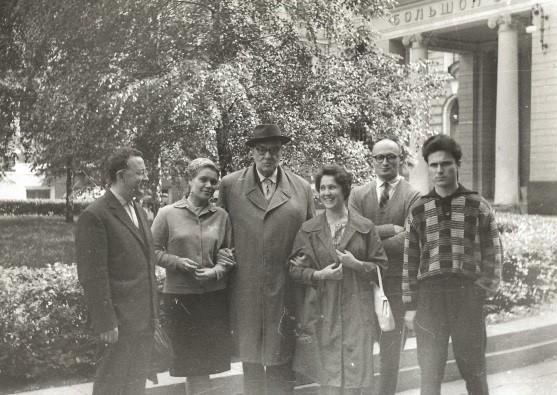
In 1957 he graduated from the conservatory with only a mediocre mark in the discipline Fundamentals of Marxism-Leninism, and entered the graduate school of Yu. A. Shaporin. In 1958 he became a class assistant to Yu. A. Shaporin and A. I. Khachaturian. During studying at the conservatory he wrote the piano sonata (1954), and the oratorio He, who Raised the Sword for soloists, mixed choir and symphony orchestra. He also created on his own texts based on the ancient Russian chronicles of the 12th-16th centuries (2nd Ed. - 1961-1962). He would later write “The oratorio, He, who Raised the Sword is the beginning of composer Sidelnikov.” He, who Raised the Sword was recognized as an outstanding work and praised by Dmitry Dmitrievich Shostakovich who noted that “almost do not play Nikolai Sidelnikov. This is a great talent that I remembered for a long time after listening to oratorio He, who Raised the Sword - an essay about ancient Russia.” The contemporary composer Eduard Artemyev considered the oratorio to be one of his most vivid impressions: “The music captivated me by the power of talent, scale, embossed thematicism and perfect mastery of all the secrets of the composer's craft.
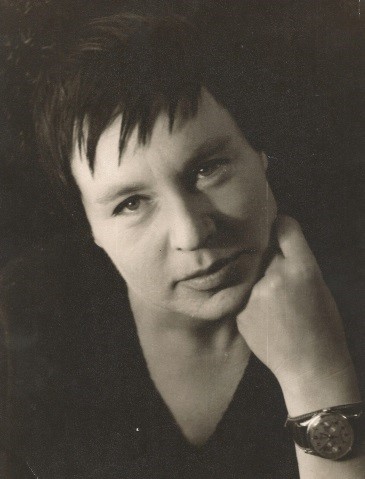
In 1962 N. N. Sidelnikov married filmmaker Helena Araya who graduated from the directing faculty of VGIK (workshop of I.P. Kopalin). They had three children together a son Savva (1965) and two daughters Anastasia (1966) and Aglaya (1972). All of them received a professional musical education.
From 1960 to 1966 N. N. Sidelnikov taught music composition at the Moscow Conservatory. From 1961 he began to lead the composition class at the Moscow State Conservatory becoming a professor in 1981. He created a unique methodology of teaching and considered his students spiritual children. Classes were held in room number 35 where to this day his portrait still hangs on the wall. Among his students are many outstanding contemporary composers: V. Artyomov, E. Artemyev, V. Martynov, S. Pavlenko, V. Komarov, K. Umansky, D. Smirnov, I. Sokolov, I. Yusupova, T. Komarova, V. Tarnopolsky, V. Kakhidze, V. Senegin, P. Kopecky and numerous others. Some of the students dedicated articles to their teacher (see publications section).
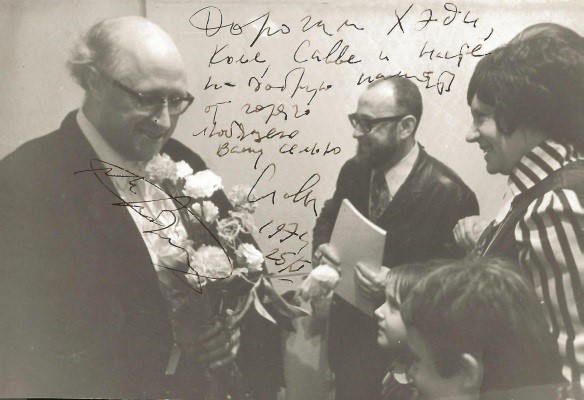
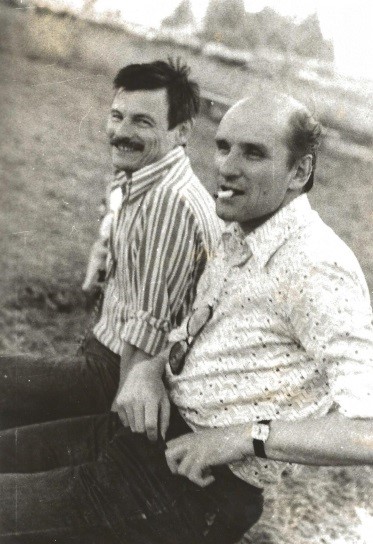 Andrey Tarkovsky and Anatoly Solonitsyn at the dacha of Nikolai Sidelnikov
Andrey Tarkovsky and Anatoly Solonitsyn at the dacha of Nikolai SidelnikovDuring the 60’s and 70’s N. N. Sidelnikov’s family included many prominent representatives of the creative intelligentsia as a friends. Such as filmmakers A. Tarkovsky and A. Gordon, musicians M. Rostropovich, A. Ginzburg, G. Haimovsky, painter M. Romadin, actor A. Solonitsyn, conductors K. Kondrashin, G. Rozhdestvensky, choreographer Yu. Grigorovich, foreign affairs columnist N. Shishlin, philologist I. Tolstoy (great-grandson L. N. Tolstoy) and many others.
Unfortunately, for various reasons, not all N. N. Sidelnikov’s joint creative projects were implemented but some were destined to be realized. In 1973 by order of M. Rostropovich, N. N. Sidelnikov composed the concert symphony Duels for cello, double bass, two pianos and percussion - the only opus created in serial technic. Many of his compositions were premiered under the direction of conductors K. Kondrashin and G. Rozhdestvensky.
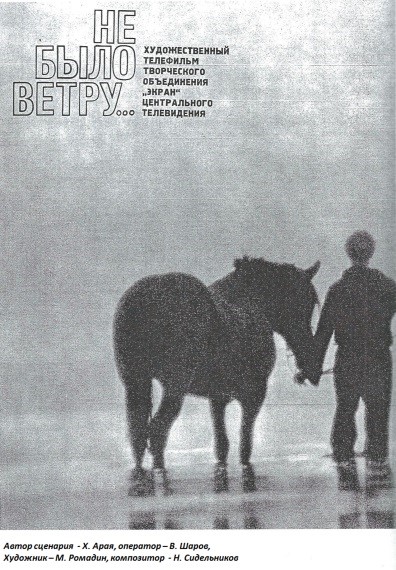
He composed music for the film There Was No Wind directed by H. Araya and staring M. Romadin as a painter. He also composed music for many movies by filmmaker A. Gordon.
Pianist G. Haimovsky, before leaving the USSR in the 70’s, performed N. N. Sidelnikov’s Russian Tales with the Chamber Ensemble of Soloists at the All-Union Radio and Television under the direction of A. Korneev. In the 90’s, G. Haimovsky took part as a producer of the premieres of several Sidelnikov`s works in New York.
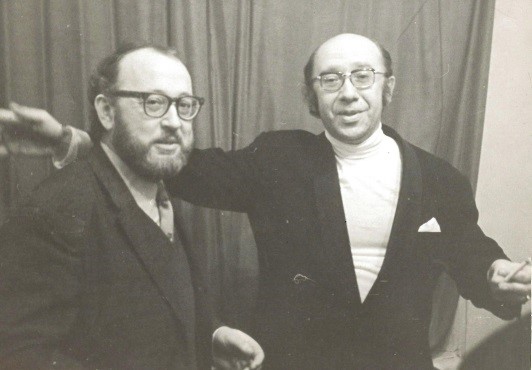
G. Rozhdestvensky
In the mid-60’s, N. N. Sidelnikov created 2 symphonies. Romantic symphony-divertissement in four portraits, symphony Hymn to the Nature on text from Dialectics of Nature by F. Engels for mixed choir, organ and symphony orchestra. He also created a number of chamber compositions: Sonata-elegy for viola solo, 25 children's pieces for piano Savva`s Flute and Five lyric poems for a choir without accompaniment on verses of revolutionary poets.
N. N. Sidelnikov achieved his first international success with the concert for 12 soloists Russian Tales written in 1968 which he dedicated to his children. The composition was included in the top ten works of the International Rostrum of Composers (IRC) season 1970/71 in Paris.
In the 70’s - 80’s he wrote a number of chamber, vocal, choral and opera-symphonic works: 25 children's pieces for piano What the Chaffinch Sang About (1971); vocal-instrumental symphony based on poems by M. Yu. Lermontov for baritone bass and the ensemble of instruments The Rebellious World of the Poet (1971); Concert Symphony Duels (1973); the opera The Scarlet Flower (1974); sonata for violin and piano in three moods Slavic triptych (1974).
In 1975 he created the cantata Cordial talks for a mixed choir, a Capella on Russian folk texts. But earlier, one of the parts of the future cantata Oh, You, My Mountains was specially written for performance at the XXIII International Competition of Polyphonic Choirs, Guido d'Arezzo, Italy. It was performed by the Chamber Choir of the Moscow Conservatory and conducted by V. Polyansky. The choir received two medals. Gold and bronze in two categories and the leader was acclaimed the best conductor.
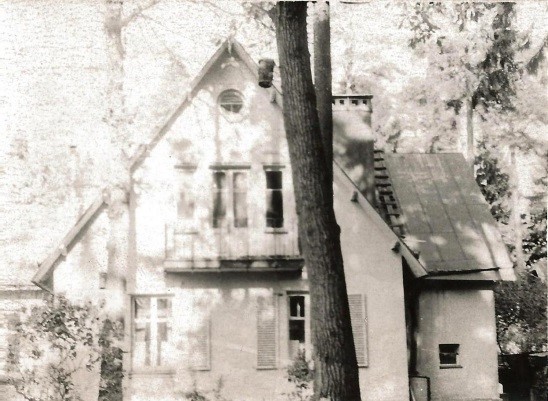 House in Troitskoe
House in TroitskoeSince 1972, N. N. Sidelnikov predominantly lived in the suburb of Troitskoe (Moscow Region). Living in his own house which he adored he drew inspiration for all his works. From the balcony could be seen a gorgeous apple orchard planted by the grandson of Lev Tolstoy, the agronomist V. I. Tolstoy. Continuing the tradition of his father he became a collector of rare publications; books on philosophy and linguistics. A special place in his library was occupied by dictionaries of Russian dialects.
The 70’s were fruitful especially in the field of vocal and choral music. During this time N. N. Sidelnikov created: an oratorio-requiem The Death of the Poet, for choir, reciter, soloists and orchestra based on poems by M. Yu. Lermontov (1976); cycle of lyric poems Romansero of Love and Death on verses by F. Garcia Lorca for mixed choir with occasional participation of piano, guitar, bass and percussion (1977); vocal cycle In the country of sedges and forget-me-nots on the verses of V. Khlebnikov for two sopranos, mezzo-soprano, dramatic tenor and piano (1978).
In 1977 N. N. Sidelnikov wrote the ballet Stepan Razin based on the novel of the same name from S. Zlobin. The ballet was staged at the Stanislavsky and Nemirovich-Danchenko Moscow Music Theater.
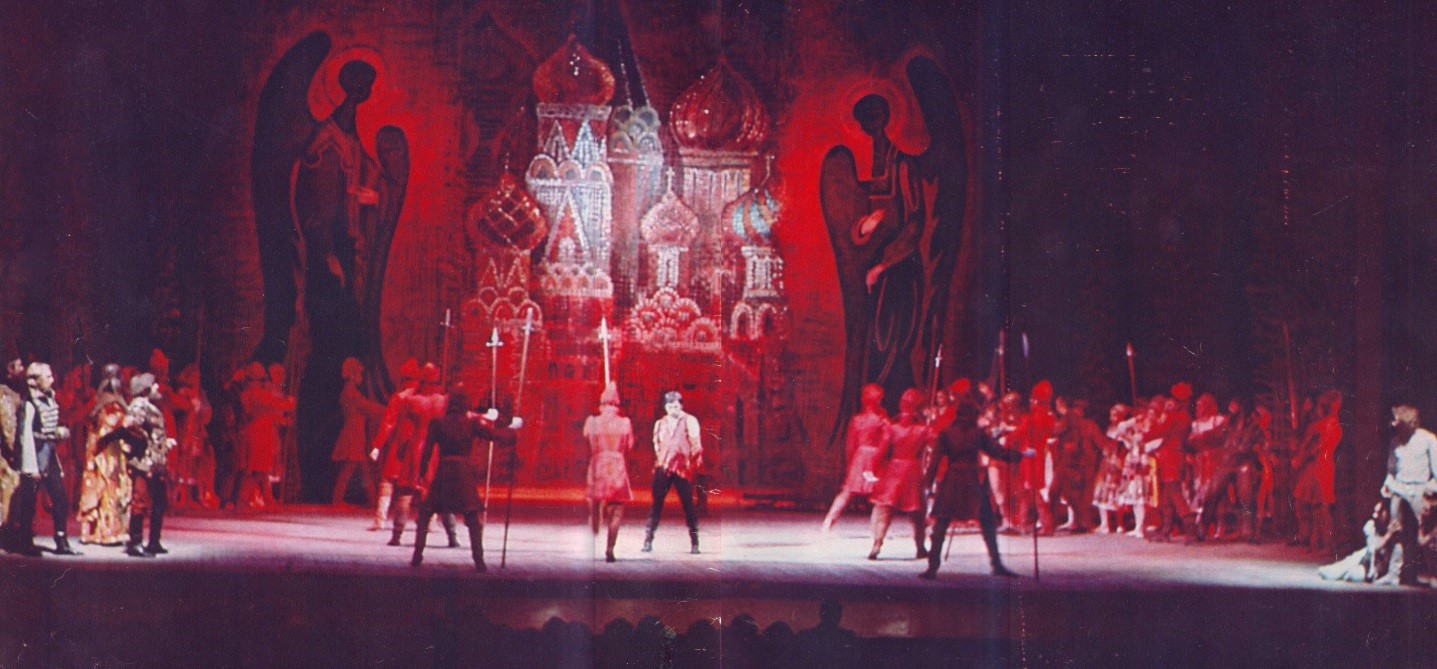
During his time at the conservatory N. N. Sidelnikov conducted open lessons and master classes for foreign delegations, musicologists and composers from China. His seminar about the history of opera From Monteverdi to Wagner was very popular with students, those interested in classical art and teachers from the conservatory.
He conducted master classes of composition in the Union republics, for example, in Kazakhstan where he was held in very high regard. He also taught in Poland, Czechoslovakia, Yugoslavia, Romania, Germany and Italy.
As part of a cultural exchange he participated in master classes in Spain with the faculty of the Moscow Conservatory. They also undertook a cruise on the steamer Leonid Sobinov to the Mediterranean and Israel. During the journey he wrote Mediterranean Elegy, which was immediately premiered by local musicians straight on the steamer.
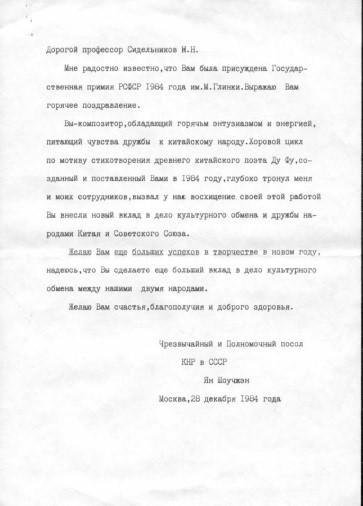
During the early 80’s N. N. Sidelnikov wrote the first book of Sichuan Elegies - Thoughts about Oneself on the verses of the Chinese poet Du Fu for mixed choir, flute, harp and vibraphone (1980). The works were premiered in the Great Hall of the Moscow Conservatory much to the delight of the People's Republic of China ambassador Yang Shouzhen and his delegation of Chinese representatives. The premiere was such a success and highly appreciated by the Chinese delegation that he was presented with a gift - the evergreen tree of life. It was cultivated by Mr. Shouzhen’s personal gardener from an 800 year old tree. In addition, he received a silk scroll with the portrait of the poet Du Fu. In a letter to the composer, Mr. Shouzhen noted the importance of the event for the cultural dialogue of two countries as well as the invaluable contribution that helped restore the “bridge of friendship” between the Chinese and Soviet people. In 1984, the composer continued to work on Du Fu's texts, composing the second book of Sichuan Elegies – Thoughts turned to a Friend. Soon thereafter the composer made a trip to China where his Sichuan Elegies cycle was performed with great success.
In the early 80s, N. N. Sidelnikov received the title of Honored Artist of the RSFSR; in 1984 - the Mikhail Glinka State Prize of the RSFSR for the Concert for 12 soloists Russian Tales and the choral cycle Romancero of Love and Death.
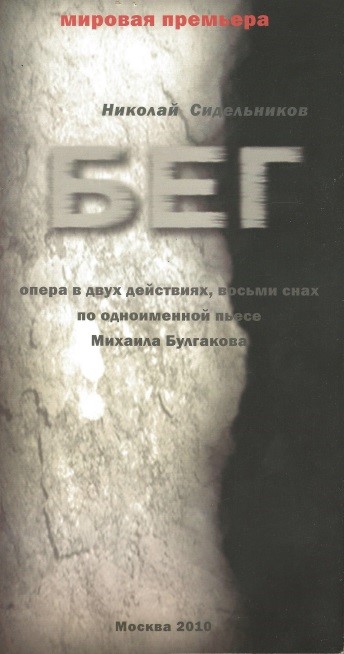
In the same period he created large scale works - the opera dilogy Devil chase (Chertogon) based on the story of the same name by N. Leskov and the opera Running based on the play of the same name by M. Bulgakov. The premiere of Running was held at the Moscow State Academic Chamber Musical Theatre, a quarter century after its inception (2010). Composer Kirill Umansky did a great job of arranging the musical material of the opera for the chamber orchestra. The work was shortened with the permission of N. N. Sidelnikov`s family. (In the author`s version the opera lasted 5 hours.) The director of the production was O. Ivanova.
In the 80’s, the composer wrote the Viennese Sinfonietta in Tone Es (quintet for Brass section) (1981), the Symphony-Sonata for cello and piano (1982), the vocal cycle of songs and romances Hamlet's Visions and Nightmares on verses by A. Blok (1987). In 1988 to the 1000th anniversary of the Baptism of Rus the composer wrote the Liturgy of St. John Chrysostom (Liturgical Concert) for a 5 voice mixed choir in two oratorios. Continuing the spiritual and religious theme of this period he created the works Evening Prayer about the Peace from the Hebrew folk poetry - for the choir a capella (1988); Cry of Tsar David (fragments of Psalms 142 and 143) for voice and organ; Passacaglia for the organ (1989); Sacred concert for the a capella choir on texts from Vespers and Lent services in 4 movements (1990); Anthems - based on the Psalms of David for mixed 5 voice choir and two flutes (1991). During the same period he created the Symphony of Russian Land’s Ruin for a large symphony orchestra (1989).
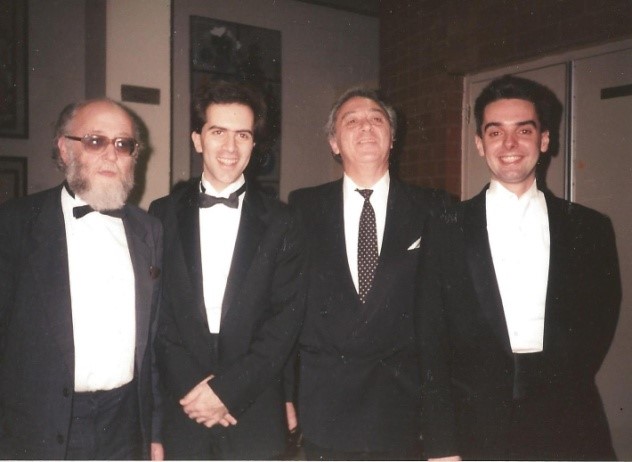
In 1990, impressed by a trip to New York, USA for the premiere of his compositions, N. N. Sidelnikov composed 13 etudes-impressions (American travel - sketches) for piano Amerika! - It`s My Love and dedicated it to his friend and pianist G. Haimovsky. The work was premiered in the USA in 1993.
The last performances of his works in New York were a great success. N. N. Sidelnikov was present during some performances.
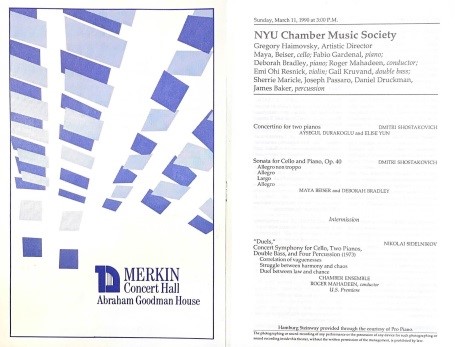
In March 1990 the Duels chamber symphony was performed at the Merkin Concert Hall. In February 1991 the vocal - instrumental symphony based on the poems by M. Yu. Lermontov Rebellious World of the Poet was also performed.
In 1991 the Sacred Concert for cappella choir conducted by Andrew Goodman was premiered at the Church of Saint Mary Virgin.
Throughout his career N. N. Sidelnikov created music for Radio and TV productions for more than 35 films. He consistently collaborated with major film studios such as Mosfilm, Lenfilm and the Dovzhenko film studio and others. His works include famous films such as The Overcoat (director’s debut of A. Batalov, 1959), Three Fat Men (dir. A. Batalov, 1966), Theft, and Fight in snowstorm (dir. A. Gordon, 1970, 1977), Nose (dir. R. Bykov, 1977), Outpost of Ilyich (dir. M. Khutsiev, 1965) and numerous others.
On the 4th February 1992 N. N. Sidelnikov was awarded the title of People's Artist of Russia.
In 1992 N. N. Sidelnikov wrote his last opus - the novel - symphony Labyrinths for piano solo, based on the ancient Greek myths of Theseus in five frescoes. He marked the last page of the manuscript “Conceived in Yorktown Heights (March 90th), started in Troitskoe (May 91st), completed May 31, 1992 at the Cancer Center, in Moscow, the day before the operation.”
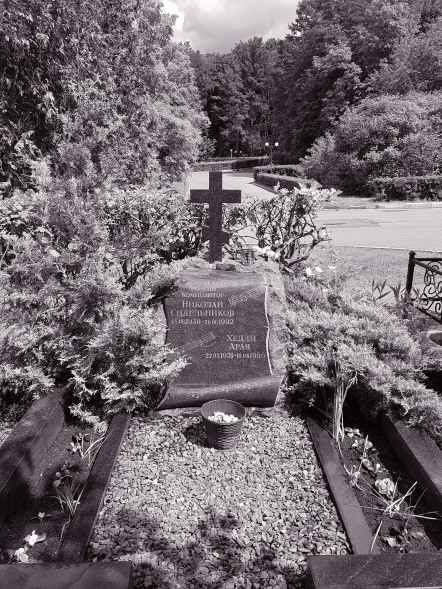
N. N. Sidelnikov passed away on the 20th June 1992. He is buried at the Troekurovsky cemetery in Moscow.
Below is a list of famous contemporary composers who honored the memory of their teacher N. N. Sidelnikov.
In 1992, Kyrill Umansky wrote The Fantasy in Memory of N. N. Sidelnikov, for organ.
In 1993, Iraida Yusupova dedicated her composition Wind Rose for a Small Orchestra to N. N. Sidelnikov.
In 1996, Ivan Sokolov became the first performer of N. N. Sidelnikov last opus - the novel-symphony for Piano, Labyrinths.
The ensemble of soloists Studio of the New Music, founded by composer Vladimir Tarnopolsky and conductor Igor Dronov, often performs N. N. Sidelnikov’s compositions.
The composer, musicologist and philosopher Vladimir Martynov devoted his book The End of Time of Composers (2002) to N. N. Sidelnikov. He stated “In Memory of My Guru Nikolai Nikolaevich Sidelnikov.”
The Modest Mussorgsky Tver College of Music annually holds the Nikolai Sidelnikov Regional Competition of pianists among students of music and art schools.